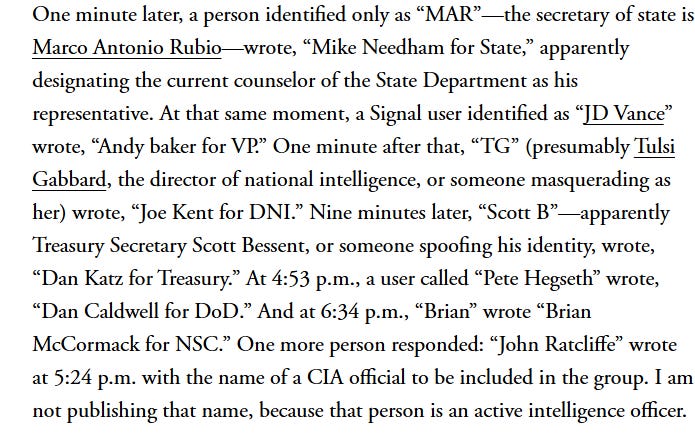Signalgate, The New Shitstorm
The Trump administration may have made a mistake but acted in good faith, not aware that Jeffrey Goldberg was “listening in”. Jeffrey Goldberg may have committed a crime.
The Signalgate will generate endless media buzz, not unlike the Russiagate eight years ago. But this time it is different and it may not turn out the way democrats think it will. Watch for the blowback.
Jeffrey Goldberg, The Atlantic’s editor-in-chief, recently found himself “accidentally” included in an Signal chat involving 18 senior White House officials. The discussion centered on the planning of last week’s U.S. strikes against the Houthis in Yemen. Goldberg’s inclusion has sparked the kind of intrigue CNN, MSNBC and other faltering mainstream medias need to bolster their audience.
The Atlantic is owned by Laurene Powell Jobs, the widow of Apple founder Steve Jobs. Mrs. Powell Jobs has been a consistent financial backer of Kamala Harris since 2003. In 2023, she made three donations totaling nearly one million dollars to the Biden-Harris reelection campaign. Additionally, she is believed to have funneled several million more into Future Forward, a super PAC supporting Harris, though exact figures remain undisclosed due to their classification as “dark money” contributions.
Mr. Goldberg is a complex figure. A self-avowed liberal hawk and staunch Zionist, he has been known to wield accusations of antisemitism to deflect criticism of the pro-Israel lobby in the U.S. During the First Intifada, he served in the Israeli military as a guard at Ketziot prison in the Negev Desert, where most Palestinians detained by Israeli forces were held.
Widely regarded as an influence agent, Goldberg has a history of shaping narratives. In October 2014, for instance, he published an article claiming that a senior Obama administration official —under the guise of anonymity— has told him that Israeli Prime Minister Benjamin Netanyahu was “chickenshit.” According to Goldberg, the official added that while Netanyahu’s fear of starting wars was an advantage, his reluctance to pursue peace with the Palestinians was a drawback. The piece, which portrayed U.S.-Israel relations as in “open crisis,” forced Secretary of State John Kerry to call Netanyahu to distance the White House from the alleged remarks.
A fervent advocate for the 2003 Iraq invasion, Goldberg has also pushed for direct U.S. involvement in Syria and saber-rattling with Iran. He played a key role in mainstream media’s propagation of the Russiagate narrative—an elaborate, Hillary Clinton campaign-orchestrated hoax involving fabricated evidence and hacking to paint Trump as a Kremlin asset. The FBI has since debunked these claims. In short, Goldberg’s work demands a pinch of salt—not for outright falsehoods, but for the carefully crafted political agendas driving it.
Against this backdrop, questions arise: Why on earth were Vice President JD Vance, Defense Secretary Pete Hegseth, National Security Adviser Mike Waltz, the CIA Director, and a host of other top Trump administration officials using Signal—an encrypted, U.S.-based messaging app—for discussions about a military operation, when the federal government possesses the world’s most advanced secure communications infrastructure?
Do you believe that Mike Waltz, the National Security Advisor, personally set up the Signal chat on his smartphone? Do you genuinely think that all these high-profile individuals were casually chatting away on their mobile devices? Of course not. How do we know this? Quite simply because staff members, duly authorized by their superiors, used their accounts to participate in this chat on their behalf. This is explicitly stated in Goldberg’s piece. What this means is that the discussion took place on the Signal desktop app, on sandboxed computers with internet access that is rerouted and highly secure, making it virtually impossible to breach.
With justifiable skepticism toward the bureaucracies they oversee, these officials may have opted for Signal to bypass federal networks—not to conceal anything nefarious, but to prevent leaks. Unlike Telegram, which Emmanuel Macron, the French President, used for nearly a decade, Signal is secured, offers end-to-end encryption and its servers are located in the U.S. Goldberg claims he was added “by mistake” by Mike Waltz due to a mix-up with another participant sharing the initials “JG.”
Jeffrey Goldberg, from the moment he realized he had been mistakenly invited to a discussion involving members of the Trump administration addressing confidential matters, should have immediately made his presence known and left the conversation rather than observing and taking notes and/or screenshots of exchanges for several days with a view to write an article. Consequently, it is likely that he committed an offense falling under the Espionage Act, as partaking, even passively, to a confidential conversation one has knowingly no business in is tantamount to espionage. The administration may have made a big blunder but acted in good faith, not aware that Goldberg was “listening in”. Goldberg may have committed a crime by listening to what he knew he should not have listened to.
A second possibility is that Goldberg is lying about how he gained access to the chat and the information he later published. If he does lie, he could face even more daunting legal repercussions—potentially implicating Israel, as few entities beyond the five UN Security Council members possess the technical prowess for such a dirty deed, not done dirt cheap.
A third scenario may be that Goldberg’s inclusion was deliberate—not to discredit The Atlantic, but to send a message. Primarily aimed at Europe and Israel, to signal a shift in U.S. policy. If so, it was not clever move. As JD Vance has noted in the chat, only 4% of U.S. trade passes through the Suez Canal, compared to over 40% of the EU’s. The U.S. currently shoulders the bulk of Red Sea maritime security, despite Houthi attacks targeting only ships linked to Israel and not U.S. commerce. This might hint at a planned U.S. Navy drawdown from the region, while also tapping into American public frustration over Europe’s and Israel’s perceived free-riding on U.S. largesse.
The critical question remains: cui bono?
Strikingly, the playbook mirrors Russiagate: the same tactics, the same exploitation by struggling mainstream media, and the same rallying cry of “national security.” These outlets—tainted by Russiagate, the Hunter Biden laptop saga, and more—now feign victimhood, retreating behind a professional ethic few believe they still uphold. The “shitstorm” rolls on, as predictable as it is revealing. Wasn’t Hillary Clinton’s private, unsecured, unencrypted email server where classified documents were exchanged and stored, a far grosser breach of national security ?
In Europe, the ferocity of the political battle unfolding in Washington is underestimated. The Trump administration’s resolve to “drain the swamp”—purging “deep state” elements embedded in the U.S. federal government as early as in the 1920s—has unleashed a conflict of unprecedented violence. A newly declassified document from the JFK files, released on March 18, 2025, offers a chilling historical parallel: a memo by Arthur M. Schlesinger Jr., a historian and special adviser to President Kennedy, titled “CIA Reorganization”. Schlesinger details how, by 1961, the CIA had effectively usurped American foreign policy, duplicating State Department functions to such an extent that 47% of diplomats in political sections of U.S. embassies worldwide were covert CIA agents.
The memo describes the CIA as a “state within a state,” with its own political desks, military staff, quasi-foreign service, combat forces, and even an air force—its budget dwarfing that of the State Department. Schlesinger’s called for reform, including splitting the CIA into separate operations and analysis entities under stricter oversight, was never implemented, underscoring the agency’s enduring autonomy. This revelation is particularly striking as it suggests that the “deep state”’, which Trump now seeks to uproot, was already a profound concern during Kennedy’s presidency.
Fast forward to today, and the CIA’s influence remains pervasive. The Paris station, reportedly housed in the same building as a major national French newspaper, is said to boasts over 120 personnel, on top of agents under diplomatic cover at U.S. Consulates.
At Langley and the FBI, the purge has quietly begun since the confirmation of DNI Tulsi Gabbard and Director Kash Patel.
The timing of Jeffrey Goldberg’s revelations coincides suspiciously with U.S.-Russia talks on Ukraine. These negotiations, progressing without European or Ukrainian input, signal a potential imposition of terms on Kyiv, reflecting a broader Euro-Atlantic divide on the conflict’s resolution.
Adding to the geopolitical tension, Washington’s frustration with Israeli Prime Minister Benjamin Netanyahu is palpable. Washington was displeased with Netanyahu’s breach of the pre-Trump inauguration ceasefire, resuming military operations in Gaza, the West Bank, and Lebanon. The U.S. strikes on the Houthis and the deployment of a second aircraft carrier were intended as concessions for Israel refraining from any further escalation—yet Tel-Aviv resumed operations immediately after the U.S. air strikes. Netanyahu’s actions, driven by political self-preservation, risk dragging Israel into a deeper crisis, further straining U.S.-Israel relations at a critical juncture. Hawks, you said ?
“Signalgate,” as this affair might soon be dubbed, may well be a deliberate destabilization effort, though its full motives and orchestrators remain opaque. The operation’s timing—amid Ukraine talks and Middle East tensions—suggests an attempt to undermine Trump’s agenda.
With two years until the 2026 midterms and no possibility of a third term, Trump’s window to deliver on his promises is narrow. Efforts to make his administration “the quickest lame duck in recent history”, as Sen. Chuck Shumer told NBC News anchor Kristen Welker three days ago, are unlikely to succeed, given his apparent determination to dismantle the “deep state” apparatus that Schlesinger warned about over six decades ago. It does not look like Donald Trump will stand down this time. It would be unwise for him to do so, given that mainstream media no longer hold significant sway over public opinion and that the Democratic party is underwater.






